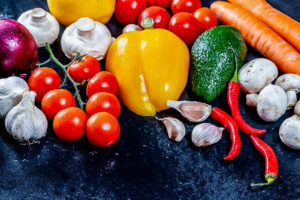Aug 13, 2024Nutritional considerations for concussion recovery
Many injuries can sideline athletes. Proper rest, rehabilitation, and nutrition all play a factor in recovery no matter the injury. And for concussions, nutrition may have a bigger role than meets the eye. Understanding both food and supplementation’s role in this recovery process is of the utmost importance in optimizing an athlete’s recovery time.
Aside from following the tips below, referring your athlete to meet with a registered dietitian post-injury will help ensure every box is checked when it comes to their nutrition.

Given the metabolic stress observed after a concussion, the best nutrition treatment is a general healthful diet that meets the athlete’s energy needs and is high in antioxidant-rich foods. Supplements, mainly creatine monohydrate and omega-3 fatty acids, have their role but do not work in isolation. Dietary measures should remain the focus of the nutrition treatment.
Dietary Considerations
Consuming a diet rich in complex carbohydrates (brown rice, oats, whole-grain bread/pasta, quinoa), protein, low-fat dairy, fruits, vegetables, and healthy fats (avocado, olive oil, and nuts/seeds) should make up the majority of an athlete’s diet during the recovery process. The most important aspect of concussion recovery is simply consuming enough calories per day to meet one’s energy needs. Daily energy needs vary based on many factors including activity level, muscle mass, height/weight, and genetics.
Weight maintenance or a slight weight gain is recommended during the healing process to ensure the athlete is consuming enough energy to facilitate the healing process. It has been shown that brain injuries, dependent on the severity, can increase whole-body energy expenditure (Factors Associated With Energy Expenditure and Energy Balance in Acute Sport-Related Concussion, 2021). Depending on the severity of the concussion, an athlete may need to consume more calories per day to maintain their weight. If an athlete is comfortable seeing their weight, asking them to weigh themselves first thing in the morning, after using the bathroom, one time per week is a simple strategy to evaluate this.
Antioxidant-Rich Foods
Foods high in antioxidants can help reduce the burden of added inflammation that occurs because of a concussion. Fruits that are high in antioxidants include, but are not limited to, blueberries, strawberries, raspberries, blackberries, oranges, and grapes. Vegetables high in antioxidants include, but are not limited to, spinach, asparagus, broccoli, beets, carrots, bell peppers, and kale. An athlete should aim for a minimum of two servings of fruit and 3-4 servings of vegetables per day (Dietary Guidelines for Americans, 2020). Eight ounces of tart cherry juice 1-2 hours before bed may also contribute positively to concussion recovery due to its high level of antioxidants and can be practical if appetite is a challenge.
Omega-3 Fats
Omega-3 fatty acids are essential fatty acids prominent in fatty fish, nuts/seeds, and plant oils. The three types of omega-3 fatty acids are alpha-linolenic acid (ALA), eicosapentaenoic acid (EPA), and docosahexaenoic acid (DHA). In the area of brain health, DHA and EPA are omega-3 fatty acids of importance due to their anti-inflammatory properties (Neuroprotection by Docosahexaenoic Acid in Brain Injury, 2014). On average, most people, including athletes, do not consume enough omega-3 fatty acids (Dietary and Biological Assessment of the Omega-3 Status of Collegiate Athletes: A Cross-Sectional Analysis, 2020). Because of its role in reducing brain inflammation and physical nerve cell damage post-concussion, choosing foods that are rich in DHA and EPA is a great strategy for optimizing recovery. Salmon, canned tuna, mackerel, and sardines are excellent options. Due to its low prevalence in food, an omega-3 supplement (with EPA and DHA12) is also warranted until an athlete is cleared to fully participate in the competition. For NCAA Division 1 athletes, NSF Certified for Sport or Informed Sport-Certified supplements are recommended. Generally recognized as safe amounts of omega-3s (up to 5000 mg/day) should be considered following a concussion (U.S. Department of Health and Human Services, 2023).
Creatine Monohydrate
Creatine Monohydrate’s role in cognitive function is an up-and-coming area of research due to the uniqueness of its chemical structure and potential role in brain injury recovery. Creatine is naturally produced in the body, but after a concussion production may be reduced, while energy demand from ATP is also increased. Creatine supplementation can play a role in replacing those lost creatine stores (Decrease in N-acetyl aspartate following concussion may be coupled to a decrease in creatine, 2013) and replenishing ATP. Creatine has also been shown to have the potential as a neuroprotective when used before or after more severe brain injuries. Given creatine’s unique function at the cellular level, it is theorized that it can reduce the burden of metabolic changes that happen after a concussion (Potential for use of creatine supplementation following mild traumatic brain injury, 2017).
» ALSO SEE: Study—Higher training volume leads to increased size, not strength
While more research trials in athletes with concussions are needed, creatine monohydrate is among the most researched performance supplements on the market, with no known negative side effects other than weight gain (International Society of Sports Nutrition position stand: safety and efficacy of creatine supplementation in exercise, sport, and medicine, 2017). Therefore, supplementation (0.1g/kg/day)6 of an NSF Certified for Sport or Informed Sport-Certified brand is a safe and potentially effective supplement for the concussed athlete (Neuroprotection for the warrior: dietary supplementation with omega-3 fatty acids, 2011).
Written by an American Sports and Performance Dietitians Association Registered Dietitian (RD). To learn more about sports nutrition and ASPDA, go to www.sportsrd.org.


